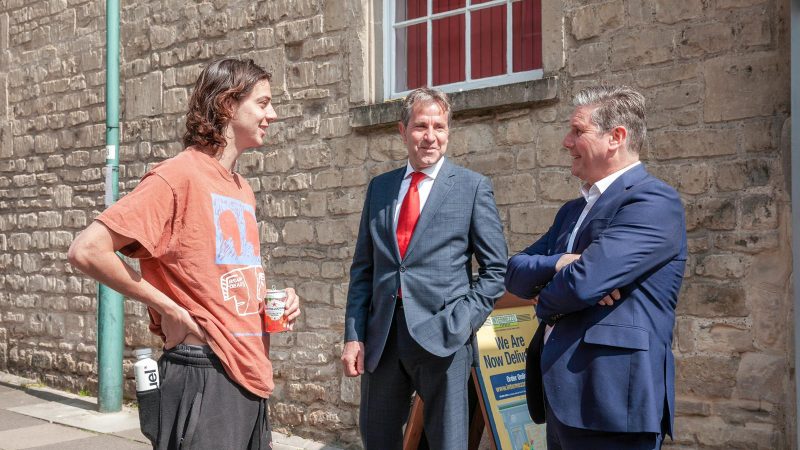
Keir Starmer is making a “jobs promise” to young people as part of wider proposals to “boost employment and increase opportunities right across the country” with a green economic recovery package involving 400,000 new jobs.
Labour’s jobs plan includes reforming the existing ‘Kickstart’ scheme with a promise that any young person aged between 16 and 24 left out of work for six months or more will be offered an education, training or employment opportunity.
Commenting on the £30bn economic recovery stimulus, which includes the creation of 400,000 jobs in low-carbon industries, Starmer said it would “secure employment in clean industries including our country’s vital manufacturing industries”.
“Under the Conservatives, our manufacturers have been neglected, putting jobs at risk whilst ministers have done favours for their friends,” the Labour leader added, referring to stories in recent weeks of Tory ‘cronyism’.
The policy announcement comes amid the lobbying row involving former Prime Minister David Cameron and reports of Boris Johnson promising to “fix” a tax issue for James Dyson, who was asked to make ventilators during Covid.
The Labour leader accused Johnson of “fixing tax breaks for his friends” during Prime Minister’s Questions in parliament on Wednesday, and argued that the public has seen a pattern of “sleaze, sleaze, sleaze” from government.
“The people of Britain deserve better – opportunities, fairness, and good jobs in their communities which are a source of pride and dignity,” Starmer said today. “The Conservatives can’t be trusted to deliver that.”
Kickstart’s success has varied across the UK. An answer from a minister to a Labour parliamentary question revealed that the scheme found work for 1.6% of young people in the South East of England, rising to 12% in Scotland.
“The Chancellor’s Kickstart scheme is too slow and does not match the scale of challenge many young people in the UK face, and we can see some places are being hit particularly hard,” Jonathan Reynolds warned today.
“With youth unemployment continuing to rise, we need urgent action that matches the scale of the challenge. Labour’s jobs promise would deliver the urgent action needed to prevent a lost generation and to build a secure economy that spreads prosperity across the country.”
Office for National Statistics figures published this week showed that the current programme has helped just 3.5% of 16- to 24-year olds who have lost their job in the past 12 months, finding work for one person for every 29 jobs lost.
“Successive Conservative governments have weakened Britain’s foundations and robbed too many people of the opportunity to achieve their potential. Going back to business as usual is not an option,” the Shadow Work and Pensions Secretary said.
Kickstart opened in September. The £2bn scheme covers minimum wage, National Insurance and pension contributions for companies signed up to the programme for 25-hours-a-week, six-month work placements for young people on Universal Credit.
A Department for Work and Pensions spokesperson told LabourList: “Despite this being a challenging time for many businesses we have created more than 150,000 vacancies through the Kickstart scheme. Thousands of young people have already started their Kickstart jobs and we expect this to ramp up as the economy reopens.”
Labour unveiled its plan for a green stimulus package aimed at recovering jobs, retraining workers to equip those affected by Covid unemployment and rebuilding businesses with a national investment bank in November.
The opposition also called on the government in February to put unspent funds from its apprenticeship levy towards a wage subsidy, which it has said could create 85,000 new apprenticeships for young people aged between 16 and 24 this year.
The levy, introduced in April 2017, requires large businesses with an annual payroll of over £3m to contribute 0.5% of their wage bill into a fund each month. The cash then has to be used within 24 months to fund apprenticeships.
Up to 25% of any of the unused money left at the end of the year can be transferred to fund opportunities provided by smaller companies, which do not pay the levy, while the rest is returned to the Treasury.
Data uncovered by The Open University in 2019 found that over £3bn of funding remained untouched. The higher education institution learned through a freedom of information request that only £480m of total funding had been used.
The number of new apprenticeships in the country has fallen significantly over the past few years, declining by 189,000 between 2016/17 and 2019/20, and new starts were down 27.6% in August to October 2020 on the same period in 2019.
Under Labour’s proposals, unspent apprentice levy funds would be redirected to agencies or combined authorities to create apprenticeships for young people who have been out of employment, education or training for six months.




More from LabourList
‘The hope that kills you’: Reflections from the final day in Gorton and Denton
MPs, union leaders and organisations react to ‘bruising’ Gorton and Denton result
A gory night for Labour